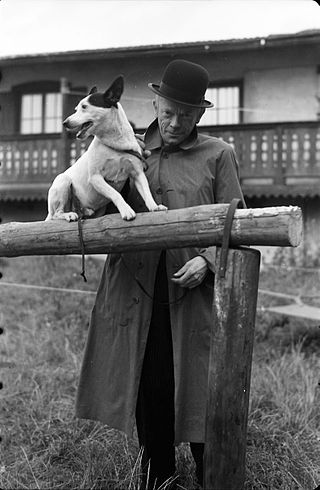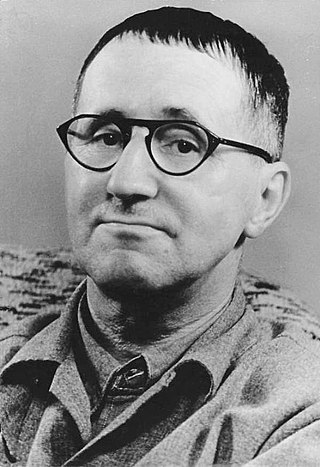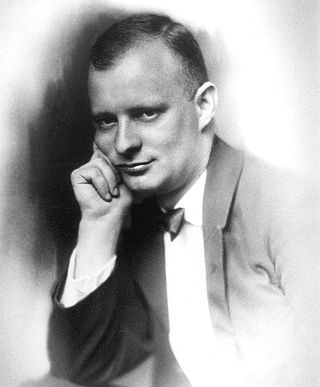Related Research Articles

Epic theatre is a theatrical movement that arose in the early to mid-20th century from the theories and practice of a number of theatre practitioners who responded to the political climate of the time through the creation of new political dramas. Epic theatre is not meant to refer to the scale or the scope of the work, but rather to the form that it takes. Epic theatre emphasizes the audience's perspective and reaction to the piece through a variety of techniques that deliberately cause them to individually engage in a different way. The purpose of epic theatre is not to encourage an audience to suspend their disbelief, but rather to force them to see their world as it is.

Life of Galileo, also known as Galileo, is a play by the 20th century German dramatist Bertolt Brecht and collaborator Margarete Steffin with incidental music by Hanns Eisler. The play was written in 1938 and received its first theatrical production at the Zurich Schauspielhaus, opening on the 9th of September 1943. This production was directed by Leonard Steckel, with set-design by Teo Otto. The cast included Steckel himself, Karl Paryla and Wolfgang Langhoff.

Mother Courage and Her Children is a play written in 1939 by the German dramatist and poet Bertolt Brecht (1898–1956), with significant contributions from Margarete Steffin. Four theatrical productions were produced in Switzerland and Germany from 1941 to 1952, the last three supervised and/or directed by Brecht, who had returned to East Germany from the United States.

Eric Russell Bentley was a British-born American theater critic, playwright, singer, editor, and translator. In 1998, he was inducted into the American Theatre Hall of Fame. He was also a member of the New York Theater Hall of Fame, recognizing his many years of cabaret performances.

Baal was the first full-length play written by the German modernist playwright Bertolt Brecht. It concerns a wastrel youth who becomes involved in several sexual affairs and at least one murder. It was written in 1918, when Brecht was a 20-year-old student at Munich University, in response to the expressionist drama The Loner by the soon-to-become-Nazi dramatist Hanns Johst.

Karl Valentin was a Bavarian comedian. He had significant influence on German Weimar culture. Valentin starred in many silent films in the 1920s, and was sometimes called the "Charlie Chaplin of Germany". His work has an essential influence on artists like Bertolt Brecht, Samuel Beckett, Loriot and Helge Schneider.
Man Equals Man, or A Man's a Man, is a play by the German modernist playwright Bertolt Brecht. One of Brecht's earlier works, it explores themes of war, human fungibility, and identity. One of the agitprop works inspired by the developments in USSR praising the bolshevik collectivism and replaceability of each member of the collective.
A Fabel is a critical analysis of the plot of a play. It is a dramaturgical technique that was pioneered by Bertolt Brecht, a 20th century German theatre practitioner.
Non-Aristotelian drama, or the 'epic form' of the drama, is a kind of play whose dramaturgical structure departs from the features of classical tragedy in favour of the features of the epic, as defined in each case by the ancient Greek philosopher Aristotle in his Poetics
Historicization is commonly referred to the transition of an item from an object of current events to an object of historical interest or to the process of gradual change in perception and interpretation of an object or idea over time.
Refunctioning is a core strategy of the aesthetic developed by the German modernist theatre practitioner Bertolt Brecht.

Conceptualised by 20th century German director and theatre practitioner Bertolt Brecht (1898–1956), "The Modern Theatre Is the Epic Theatre" is a theoretical framework implemented by Brecht in the 1930s, which challenged and stretched dramaturgical norms in a postmodern style. This framework, written as a set of notes to accompany Brecht's satirical opera, ‘Rise and Fall of the City of Mahagonny’, explores the notion of "refunctioning" and the concept of the Separation of the Elements. This framework was most proficiently characterised by Brecht's nihilistic anti-bourgeois attitudes that “mirrored the profound societal and political turmoil of the Nazi uprising and post WW1 struggles”. Brecht's presentation of this theatrical structure adopts a style that is austere, utilitarian and remains instructional rather than systematically categorising itself as a form that is built towards a more entertaining and aesthetic lens. ‘The Modern Theatre Is the Epic Theatre’ incorporates early formulations of Brechtian conventions and techniques such as Gestus and the V-Effect. It employs an episodic arrangement rather than a traditional linear composition and encourages an audience to see the world as it is regardless of the context. The purpose of this new avant-garde outlook on theatrical performance aimed to “exhort the viewer to greater political vigilance, bringing the Marxist objective of a classless utopia closer to realisation”.
The Messingkauf Dialogues is an incomplete theoretical work by the twentieth-century German theatre practitioner Bertolt Brecht. John Willett translates "Der Messingkauf" as "Buying Brass". According to one Brecht scholar "Brecht worked on [the Messingkauf] primarily during the late 1930s and early 1940s. In Brecht’s words it contains, “a lot of theory in dialog form.”"
Mr Puntila and His Man Matti is an epic comedy by the German modernist playwright Bertolt Brecht. It was written in 1940 and first performed in 1948.
The Decision, frequently translated as The Measures Taken, is a Lehrstück and agitprop cantata by the twentieth-century German dramatist Bertolt Brecht. Created in collaboration with composer Hanns Eisler and director Slatan Dudow, it consists of eight sections in prose and unrhymed, free verse, with six major songs. A note to the text by all three collaborators describes it as an "attempt to use a didactic piece to make familiar an attitude of positive intervention."

The Baden-Baden Lesson on Consent is a Lehrstück by the German dramatist Bertolt Brecht, written in collaboration with Slatan Dudow and Elisabeth Hauptmann. Under the title Lehrstück it was first performed, with music by Paul Hindemith, as part of the Baden-Baden festival on 28 July 1929, at the Stadthalle, Baden-Baden, directed by Brecht, designed by Heinz Porep.
Caspar Neher was an Austrian-German scenographer and librettist, known principally for his career-long working relationship with Bertolt Brecht.
Downfall of the Egotist Johann Fatzer is an unfinished play by Bertolt Brecht, written between 1926 and 1930. Translated as Downfall of the Egotist Johann Fatzer or Demise of the Egotist Johann Fatzer, the play is often called the Fatzer Fragment, or simply Fatzer.

Eugen Berthold Friedrich Brecht, known as Bertolt Brecht and Bert Brecht, was a German theatre practitioner, playwright, and poet. Coming of age during the Weimar Republic, he had his first successes as a playwright in Munich and moved to Berlin in 1924, where he wrote The Threepenny Opera with Elisabeth Hauptmann and Kurt Weill and began a life-long collaboration with the composer Hanns Eisler. Immersed in Marxist thought during this period, Brecht wrote didactic Lehrstücke and became a leading theoretician of epic theatre and the Verfremdungseffekt.

Yılmaz Onay was a Turkish author, theatre director and translator.
References
- Willett, John. 1967. The Theatre of Bertolt Brecht: A Study from Eight Aspects. Third ed. London: Methuen. ISBN 0-413-34360-X. p. 28.